Table of Contents
IBPS PO Mains Quantitative Quiz
Quantitative Aptitude is a nerve-racking section especially in the main examination. The intense practice is required to balance Speed with respect to accuracy. The IBPS PO Mains Study Plan 2019 consists of quantitative aptitude quizzes based on the latest pattern. Moreover, various shortcut tricks & tips have been provided in solutions by experts. Bankeradda will provide daily quizzes for practice as the IBPS PO Mains is scheduled for 30th November 2019. So practice to sail through IBPS PO Mains Exam.
Q1. Ram and Shyam are travelling from point A to B, which are 60 km apart. Travelling at a certain speed ram takes one hour more than Shyam to reach point B. If Ram doubles his speed he will take 30 minutes less than Shyam to reach point B. At what speed was Ram driving from point A to B ?
(a) 15 kmph
(b) 35 kmph
(c) 30 kmph
(d) 25 kmph
(e) 20 kmph
Q2. Sanjay started his journey to a certain place from home at 7 a.m. by bike. After going a certain distance, the bike went out of order. Then he rested for 35 minutes and come back to house walking all the way and come back to home at 1 p.m. If the bike runs at 10 kmph and his walking speed is 1 km/hr, then the distance covered on bike is :

.
Q3. A grocer buys mustard oil at the rate of Rs. 34 per litre and rapeseed oil at Rs. 36/litre and mixes them in 2 : 1 and sells the mixture at Rs. 36/litre. Then what is the approximate profit percentage he earned?

Q4. Soniya and Priyanka started from Amethi and Bellari for Bellari and Amethi respectively , which are 645 km apart. They meet after 15 hours. After their meeting, Sonia increased her speed by 3 km/h and Priyanka reduced her speed by 3 km/h, they arrived at Bellari and Amethi respectively at the same time. What is their initial speeds ?
(a) 24 km/h and 30 km/h
(b) 25 km/h and 18 km/h
(c) 18 km/h and 21 km/h
(d) 20 km/h and 23 km/h
(e) None of these
Q5. A person sells his table at a profit of ![]() and the chair at a loss of
and the chair at a loss of ![]() but on the whole he gains Rs. 25. On the other hand if he sells the table at a loss of
but on the whole he gains Rs. 25. On the other hand if he sells the table at a loss of ![]() and the chair at a profit of
and the chair at a profit of ![]() then he neither gains nor loses. Find the cost price of the table and the chair.
then he neither gains nor loses. Find the cost price of the table and the chair.
(a) Rs. 360, Rs. 240
(b) Rs. 380,Rs 260
(c) Rs. 400, Rs. 420
(d) Rs. 360, Rs 410
(e) none of these
Directions (6-7): The petrol prices shot up by 7% as a result of hike in the price of crudes. The price of petrol before the hike was Rs. 54 per litre. Rahul travels 2400 kms every month and his car gives a mileage of 18 kms to a litre.
Q6. Find the increase in the expenditure that Rahul has to incur due to the increase in the price of petrol (to the nearest rupee):
(a) Rs. 504
(b) Rs. 603.4
(c) Rs. 600
(d) Rs. 700.6
(e) None of these
Q7. By approximately how many kms should Rahul reduce his travel if he wants to maintain his expenditure at the previous level (prior to the price increase) ?
(a) 157 km
(b) 168 km
(c) 143 km
(d) 212 km
(e) 187 km
Q8. X started from a point A towards point B. After 2 hours. Y started from B towards A. By the time X travelled one-fifth of the total distance, Y had also travelled the same. If Y’s speed is thrice that of X’s speed, find the difference in the times (in hours) taken by X and Y to reach their destinations.
(a) 10
(b) 20
(c) 15
(d) 25
(e) none of these
Q9. Raghav bought 25 washing machines and some microwave ovens for Rs. 2,05,000. He sold 80% of the washing machines and 12 microwave ovens for a profit of Rs. 40,000. Each washing machine was marked up by 20% over cost and each microwave oven was sold at a profit of Rs. 2,000. The remaining washing machines and 3 microwave ovens could not be sold. What is Raghav’s overall profit/loss ?
(a) Rs. 1000 profit
(b) Rs. 2500 loss
(c) Rs. 1000 loss
(d) Can’t be determined
(e) none of these
Q10. A sells to B goods at five-thirds the rate of profit at which B has decided to sell it to C. C, on other hand, sells it to D at one-third the rate of profit at which B sold it to C. If D gives Rs. 2145 to C at 10% profit, how much did A buy it for ?
(a) Rs. 1000
(b) Rs. 2000
(c) Rs. 1500
(d) Rs. 1800
(e) none of these
Q11. In a journey of 48 km performed by tonga, richshaw and cycle in that order, the distance covered by the three mediums in that order are in the ratio of 8 : 1 : 3 and charges per kilometre in that order are in the ratio of 8 : 1 : 4. If the tonga charges 24 paise per kilometre, the total cost of the journey is
(a) Rs. 9.24
(b) Rs. 10
(c) Rs. 12
(d) Rs. 28
(e) Rs 15.24
Direction (12-15): What value will come in place of the question mark (?) in the following question?
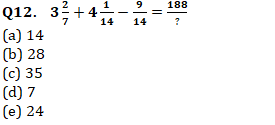


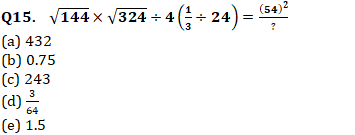
solutions:















For 200+ most important arithmetic questions
- Quantitative Aptitude Study Notes for Bank Exams
- 100 MCQs Data Interpretation | Download Free PDF’s of DI
- Quantitative Aptitude Questions for all Competitive Exams

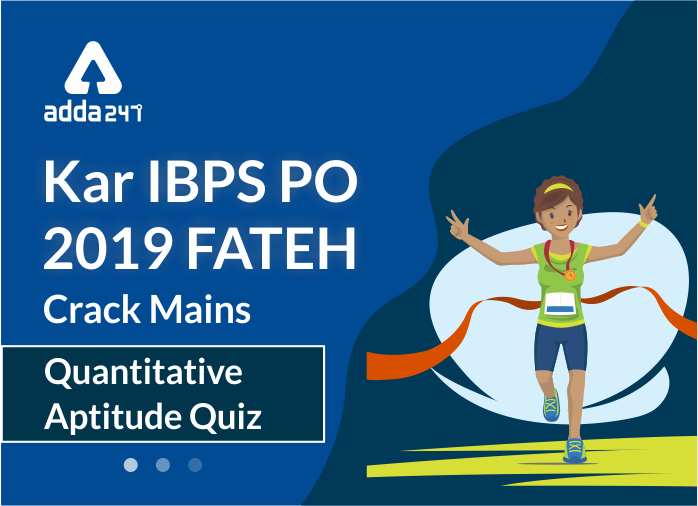
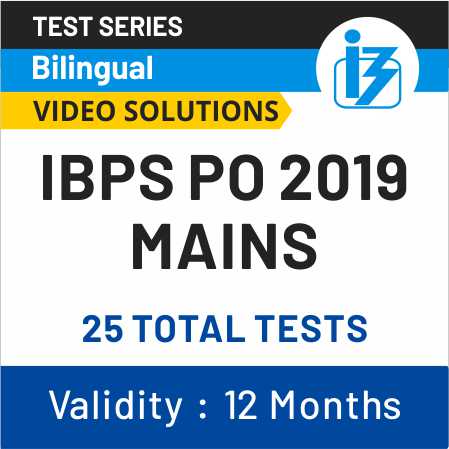


 GA Capsule for SBI Clerk Mains 2025, Dow...
GA Capsule for SBI Clerk Mains 2025, Dow...
 The Hindu Review October 2022: Download ...
The Hindu Review October 2022: Download ...
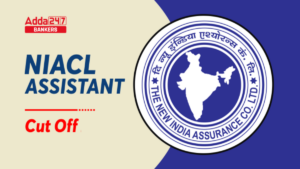 NIACL Assistant Mains Cut Off 2025 Out, ...
NIACL Assistant Mains Cut Off 2025 Out, ...





